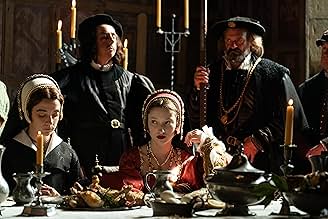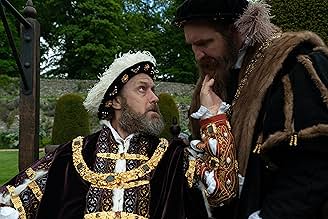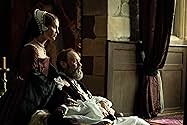IMDb RATING
6.3/10
5.9K
YOUR RATING
Katherine Parr, the sixth wife of King Henry VIII, is named regent while the tyrant battles abroad. When the king returns, increasingly ill and paranoid, Katherine finds herself fighting for... Read allKatherine Parr, the sixth wife of King Henry VIII, is named regent while the tyrant battles abroad. When the king returns, increasingly ill and paranoid, Katherine finds herself fighting for her own survival.Katherine Parr, the sixth wife of King Henry VIII, is named regent while the tyrant battles abroad. When the king returns, increasingly ill and paranoid, Katherine finds herself fighting for her own survival.
- Awards
- 1 win & 2 nominations total
Linnea Martinsson
- Maud Lane
- (as Linnéa Martinsson)
Lisa Pyk
- Eleanor Browne
- (as Lisa Pyk Wirström)
Featured reviews
Alicia Vikander and Jude Law . The try of Karim Ainouz to explore the contribution of Katherine Parr to modelate last part of reign of her royal husband and the delicate balance between risks.
Motives to see this film, correct crafted, not always faithful to historical facts but working as honest sketch about a period and its challenges. And not bad resume of Henry VIII reign and the relation with his wives.
The only reproches - the feeling about soulness story, a presentation of venerable history teacher to his students after too many years of teaching. Second, the eccentric end and the impression about feminist manifesto.
But the costumes, rooms, relation of Katherine with the children of her king and the nice performances- Jude Law is, real, a good Henry VIII- are enough good points for appreciate this film.
Motives to see this film, correct crafted, not always faithful to historical facts but working as honest sketch about a period and its challenges. And not bad resume of Henry VIII reign and the relation with his wives.
The only reproches - the feeling about soulness story, a presentation of venerable history teacher to his students after too many years of teaching. Second, the eccentric end and the impression about feminist manifesto.
But the costumes, rooms, relation of Katherine with the children of her king and the nice performances- Jude Law is, real, a good Henry VIII- are enough good points for appreciate this film.
I like historic biopics of the decade of Henry VIII and Elizabeth I. This was solid. Not bad but also not among the greatest but it still has some features to appreciate. While the story itself is maybe not rich enough to fill a feature film and sometimes dragged, due to a mediocre direction, its the actors who make this worthwhile. Alicia Vikander in the lead role plays it very well and giving it a lot of more than there is on paper. The standout is Jude Law as Henry VIII who really gives one of his best recent performances and deserves much more attention for it than he got. Its a great portray of the king. Also Law plays it unlikely the way he usually plays his role so this gives us a new facette of Jude Law's abilities.
The look and feel was also good, costumes and production design worth to pick out.
Dont look for too much historical authenticy but rather enjoy visiting that decade.
The look and feel was also good, costumes and production design worth to pick out.
Dont look for too much historical authenticy but rather enjoy visiting that decade.
I liked it! Was it the best historical drama ever? No.... But it was still entertaining. It's worth it just to watch Jude Law!!! Jude law was extraordinary. His interpretation of Henry felt historically accurate although the story itself isn't historically accurate. Alicia Vikander is always fun to watch. One of my favorites of hers is "Royal Affair". She just knows how to rock a period film.
It really captured how up and down Henry was, how his leg injury affected him, and how domineering and paranoid he could be. Throughout the whole film, I was constantly scared for Katherine's life. Overall, it was an interesting perspective about the king's last wife that is not normally depicted in TV or cinema.
It really captured how up and down Henry was, how his leg injury affected him, and how domineering and paranoid he could be. Throughout the whole film, I was constantly scared for Katherine's life. Overall, it was an interesting perspective about the king's last wife that is not normally depicted in TV or cinema.
This film is set during the last days of Henry VIII (1546-7), with Jude Law as the King and Alicia Vikander as his sixth and last wife, Catherine Parr, who was also mother in all but name to the king's three children (only one of whom ever knew their actual mother).
The film starts with a caption which says (I forget the exact words) that there are always gaps in our knowledge of history, which we often fill with things we've made up. Well there aren't quite so many gaps as this film seems to suggest. The ending is entirely fictional, and there's at least one plot point that's total fabrication.
Does this matter, given that they were open with us? Probably not. Law is excellent as the sick, dying and paranoid king. Vikander is also excellent as the woman who must constantly tread a microscopically thin line between giving the king the support and affection he needs and becoming the third of his wives to be executed. Simon Russell Beale radiates oily menace as the odious Bishop Gardiner, and the rest of the ensemble cast do a good job in portraying a court torn between jockeying for advancement and fearful of provoking one of the king's irrational outbursts.
I do have one issue with the film: in an early scene we see Erin Doherty as Anne Askew the religious reformer (or radical, depending on your point of view) preaching to her followers in the woods. This is a dramatic and moving scene, and one hopes that Askew is going to feature prominently. She doesn't. Less than two minutes later we learn that Askew has been arrested, tortured and burned at the stake. We see nothing of this, which struck me as a missed opportunity.
That aside, we get a moving and dramatic film which skirts round the edge of actual history.
Oh; and if a King writes a song, of *course* the whole court will learn the words.
The film starts with a caption which says (I forget the exact words) that there are always gaps in our knowledge of history, which we often fill with things we've made up. Well there aren't quite so many gaps as this film seems to suggest. The ending is entirely fictional, and there's at least one plot point that's total fabrication.
Does this matter, given that they were open with us? Probably not. Law is excellent as the sick, dying and paranoid king. Vikander is also excellent as the woman who must constantly tread a microscopically thin line between giving the king the support and affection he needs and becoming the third of his wives to be executed. Simon Russell Beale radiates oily menace as the odious Bishop Gardiner, and the rest of the ensemble cast do a good job in portraying a court torn between jockeying for advancement and fearful of provoking one of the king's irrational outbursts.
I do have one issue with the film: in an early scene we see Erin Doherty as Anne Askew the religious reformer (or radical, depending on your point of view) preaching to her followers in the woods. This is a dramatic and moving scene, and one hopes that Askew is going to feature prominently. She doesn't. Less than two minutes later we learn that Askew has been arrested, tortured and burned at the stake. We see nothing of this, which struck me as a missed opportunity.
That aside, we get a moving and dramatic film which skirts round the edge of actual history.
Oh; and if a King writes a song, of *course* the whole court will learn the words.
Worth seeing movie but there are some significant problems - which are the fault of the director.
The positives: the film is absorbing with good performances, costumes and sets.
But a bunch of negatives, including some completely false presentation of history, particularly regarding Henry VIII's death.
This is unforgivable IMO.
And although the premise of the movie (based on a novel) is Catherine Parr as "feminist" queen, the movie inexplicably omits important information and context that actually illustrate her "feminist" achievements. For example no mention of her backstory (that she was twice a widow by the age of 31 when she was married to Henry VIII) and not clarifying her remarkable educational abilities and accomplishments including that she was fluent in Latin, French and Italian and the first woman in England to publish written work in English. Historians describe her as having good sense, moral rectitude, compassion, firm religious commitment, a strong sense of loyalty and devotion and embracing Henry's children Mary, Elizabeth and Edward.
There are also noticeable and distracting script and social behavior anachronisms - examples such as casual dialogue and contemporary language such as using the word "pregnant" instead of "with child"
Getting back to the director - a man, not British and Firebrand was his first English language film.
Hiring him as the director was a poor decision and disrespectful to the subject matter.
There would have been multiple other good choices - especially people with period piece experience such as Simon Curtis (Downton Abby), Tom Hooper (King's Speech), Stephen Frears.
The positives: the film is absorbing with good performances, costumes and sets.
But a bunch of negatives, including some completely false presentation of history, particularly regarding Henry VIII's death.
This is unforgivable IMO.
And although the premise of the movie (based on a novel) is Catherine Parr as "feminist" queen, the movie inexplicably omits important information and context that actually illustrate her "feminist" achievements. For example no mention of her backstory (that she was twice a widow by the age of 31 when she was married to Henry VIII) and not clarifying her remarkable educational abilities and accomplishments including that she was fluent in Latin, French and Italian and the first woman in England to publish written work in English. Historians describe her as having good sense, moral rectitude, compassion, firm religious commitment, a strong sense of loyalty and devotion and embracing Henry's children Mary, Elizabeth and Edward.
There are also noticeable and distracting script and social behavior anachronisms - examples such as casual dialogue and contemporary language such as using the word "pregnant" instead of "with child"
Getting back to the director - a man, not British and Firebrand was his first English language film.
Hiring him as the director was a poor decision and disrespectful to the subject matter.
There would have been multiple other good choices - especially people with period piece experience such as Simon Curtis (Downton Abby), Tom Hooper (King's Speech), Stephen Frears.
Did you know
- GoofsKatherine Parr was not arrested in the presence of the king, nor was she dragged off to a dungeon. The warrant for her arrest was dropped, and found by a loyal servant, who brought it straight to her. Katherine completely lost her composure at seeing the king's signature on the document, and began to cry and scream. Henry heard her, and sent a servant to see what was the matter. When he found out, he sent word for her not to worry, and received her the next day. Katherine had learned her lesson; she was submissive and humble to Henry from then on, and he remanded her arrest warrant. Ultimately, her life was saved by his death.
- How long is Firebrand?Powered by Alexa
Details
- Release date
- Countries of origin
- Official sites
- Language
- Also known as
- La Reina De Fuego
- Filming locations
- Production companies
- See more company credits at IMDbPro
Box office
- Gross US & Canada
- $521,366
- Opening weekend US & Canada
- $233,373
- Jun 16, 2024
- Gross worldwide
- $4,525,819
- Runtime
- 2h 1m(121 min)
- Color
- Sound mix
- Aspect ratio
- 2.39 : 1
Contribute to this page
Suggest an edit or add missing content


































